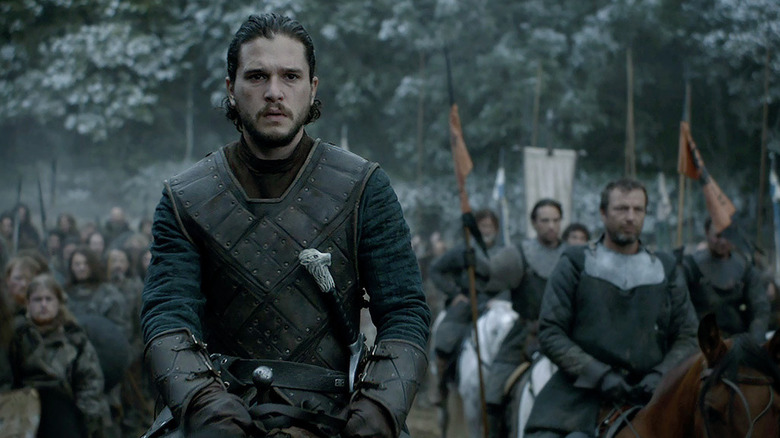How George R. R. Martin Contributed To HBO's Game Of Thrones Scripts
Back in 2011, no one could have predicted that "Game of Thrones" would soon become the biggest show on television, and arguably of all time. While HBO was hot off of a decade-plus of major hits, and adult genre TV was on the rise, it was impossible to predict the success that a big-budget epic fantasy series could have worldwide.
Having the right time, right place, and right production team and cast all played a part, but they had a strong foundation out of the gate thanks to author George R.R. Martin, whose "A Song of Ice and Fire" novels were already massively popular. The rich characters and interwoven storylines of the books were ripe for a live-action adaptation, and in the early seasons, Martin stayed closely involved, even writing a handful of episodes himself.
For the first four seasons of "Game of Thrones," Martin wrote one script per year: "The Pointy End" in Season 1, "Blackwater" in Season 2, "The Bear and the Maiden Fair" in Season 3, and "The Lion and the Rose" in Season 4. But his creative role extended beyond those four scripts. "While George isn't in the writers' room, he reads the outlines and gives his notes," series producer Bryan Cogman explained to the Observer in 2015.
The show gained steady momentum through those first four seasons, with many pointing to Season 4 as the absolute pinnacle of the series. However, starting with Season 5, Martin stopped his tradition of writing individual episodes himself, and he grew distant from the show as a whole, for reasons that he's said have more to do with showrunners David Benioff and D.B. Weiss.
George R. R. Martin moved away from Game of Thrones after Season 4
After Season 4, George R. R. Martin stopped writing scripts for "Game of Thrones." In his interview with Observer, Bryan Cogman said that this was so that the author could focus on writing "The Winds of Winter," the highly anticipated sixth book in the series, which has still not been published at the time of writing. However, Martin's version, when talking to The New York Times in 2022 ahead of the "House of the Dragon" premiere, was a little different.
"By Season 5 and 6, and certainly 7 and 8, I was pretty much out of the loop," Martin said. When asked why he grew distant from the show's creative development, he referred to showrunners D.B. Weiss and David Benioff, replying, "I don't know — you have to ask Dan and David." In the immediate wake of the "Game of Thrones" finale in 2019, Martin spoke more extensively on the struggles of collaborating on the show.
"It can be ... traumatic," the author said in an interview with Fast Company (via Digital Spy). "Sometimes their creative vision and your creative vision don't match, and you get the famous creative differences thing –- that leads to a lot of conflict." He explained that studio can often get in the way, with things like the popularity of certain characters often having impact on what's asked of the writing team. When speaking specifically about the controversial final season of "Game of Thrones," Martin called it "not completely faithful," adding, "Otherwise, it would have to run another five seasons."
Has George R. R. Martin written for House of the Dragon?
Unlike with "Game of Thrones," George R.R. Martin has never written scripts for "House of the Dragon," though he has been very involved. However, as was the case on "Game of Thrones," Martin has taken issue with certain creative decisions on the Targaryen-centric prequel as well.
In a blog post during Season 2, which aired in 2024, Martin shared his desire to discuss "everything that's gone wrong" with "House of the Dragon" — a premise that he's brought up on several other occasions since, usually regarding changes to the source material.
It's worth noting that "Game of Thrones" diverged far more significantly from the source material after Martin stopped being as involved in Season 5 and beyond — divergences that led to more controversial moments and storylines than what was seen in the first half of the show.
"House of the Dragon," on the other hand, took a step up in Season 2, with richer material for its characters and growing depth for its many storylines. Hopefully, that trend will hold true in "House of the Dragon" Season 3 and beyond.


